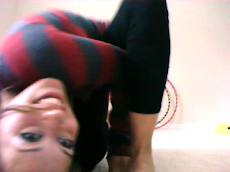At the farm I would finish each class with an expression of gratitude for the moment, some kind of philosophical thought or reflection; perhaps even a poem. I might call their attention to their own energy field, asking them to explore how it felt. Perhaps they feel a tingling on their skin or a feeling of pervading contentment.
Here on the beach that seems ridiculous and I am caught in a moment of horror, paralysed by inability to say anything at all, while this circle stare at me, waiting.
The feeling passes. I place my hands together and thank them for practising with me. Namaste. They smile.
It bothers me that I sometimes feel slightly apologetic for yoga. I think this is the reason that most people know yoga for its toning abilities rather than for "the settling of the activity in the mind" as Patanjali wrote in the Yoga Sutras, 2000 years ago. The concept of slowing thought is quite bizarre in a world where efficiency is such a virtue. Whereas I, in my slow wanderings, embrace it or lose my mind altogether.
For me, the concept I have most desire to communicate is one of space. Of achieving order within a chaotic inner world. Distilling the eternal activity of the mind into a rare kind of peace.
Patanjali defines the space, the depth found within absence of thought - as samadhi.
Samadhi is a state of consciousness where the individual as an entity becomes integrated with its surroundings - a state of total immersion. There are no thoughts, no focus, no drifting of the mind into anything other than the space between breaths. There is nothing between you and the world. You somehow feel as if you are everything.
The perspective this provides is life-changing.
Put yourself there, now. Close your eyes.
Turn your senses inward.
Breathe.
And watch.
Your breath becomes slow, drawing from somewhere deep. With every inhale you suck in your attention, pulling it deep inside. You focus.
Your awareness is pointed, following the sensation of the air as it touches your nostrils, your throat, your lungs.
Your belly rises. You expand. You pause, caught in a moment of stillness, the air frozen in your lungs.
Then the breath releases. Slow… slow. Smoothly falling from within you.
It flows out through your nose and you follow the sensation as it hits your throat, your nostrils, your upper lip. The breath that hits your skin is warm and damp.
Your belly falls. You sink. You pause.
You are deep enough into meditation that your thoughts slow. Your attention withdraws. The distractions become less interesting. The little monkey brain is throwing its best creations at you and you just steer your attention away. Back to the breath. Back to the breath. Back to the breath.
And then… everything falls away. Your body is there but not there. You are above but simultaneously below. All of a sudden your attention, so focused on this single point, somehow takes in everything at once. You sense everything and yet nothing at all. There is nothing in between you and the world, nothing to differentiate you from everything else that exists. Your whole concept of separateness dissolves.
This, then, is what it means to be 'at one.'
Wind is simply movement of air. Without the movement, wind does not exist, even though the air is still there.
The mind is thought. Thoughts are always present; what changes is our choice not to pick them up and look at them, not to be swept into their whirl.
Without attachment to thought, there is no mind, and the boundaries of the brain and the body seem to fall away. All that is left is space.
Now, yoga. Here, samadhi. A state of “pure, unbounded awareness.”
Like I said, in India, where it originated, yoga is a way of living. A state of mind. Not just a way of bending the body. But we're not in India. I have never even been to India.
To translate what I've learned and what I revere about the ancient teachings can be hard. But the essence is so simple it reaches everyone whether they know it or not.
I have just given them an hour and a quarter of stretching and breathing. All they have done is attempt to synchronise their breath with their body. And they get it.
The class leaves, and I remain. Pausing. I have never been on a more idealistic picture of paradise than this tiny island. A state of pure, unbounded perfection.

